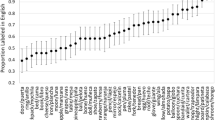Abstract
Chinese-English bilinguals were asked to read a passage with spontaneous bilingual code switchings, compared with a unilingual Chinese translation of the passage, a unilingual English translation, a translation with random switchings, and a translation with only nouns switched into English. There was no difference between the reading speed for the passage with natural switchings and the unilingual Chinese passage, thus questioning the need to postulate a bilingual imput/output switch. The speed for reading passages with artificial switchings was slower. In a translation task, the naturally switched items required less time in Chinese-to-English translations compared with English-to-Chinese translations. This indicates that in natural code switchings, the English lexical items produced were more available, even though English is generally the weaker language.
Similar content being viewed by others
References
Albert, M. L., & Obler, L. K.The bilingual brain. New York: Academ Press, 1978.
Asuncion-Lande, N. C.The social implications of bilingualism: Language use and interpersonal communication in the Philippines. Paper Presented at the Fifth International Congress of Applied Linguistics, Montreal, August 20–26, 1978.
Dalrymple-Alford, E. Prestimulus language cuing and speed of identifying Arabic and English words.Psychological Reports, 1967,21, 27–28.
Dalrymple-Alford, E., & Aamiry, A. Speed of responding to mixed language signals.Psychonomic Science, 1967,9, 525–536.
Ellis, N. C., & Hennelly, R. A. A bilingual word-length effect: Implications for intelligence testing and the relative ease of mental calculation in Welsh and English.Bristish Journal of Psychology, 1980,71, 43–51.
Hasselmo, N. How can one measure the effects which one language may have on the other in the speech of bilinguals? In M. Kelly (Ed.),Description and measurement of bilingualism: An international seminar, University of Moncton, June 6–14, 1967. University of Toronto Press, Toronto, 1969.
Hoffer, B.Problems in sociolinguistic translation. Paper presented at the Fifth International Congress of Applied Linguistics, Montreal, August 20–26, 1978.
Hoosain, R., & Osgood, C. E.Information processing times for English and Chinese words. Submitted for publication, 1982.
Kolers, P. A. Reading and talking bilingually.American Journal of Psychology, 1966,79, 357–376.
Lindholm, K. J., & Padilla, A. M.Linguistic interaction in bilingual children. Spanish Speaking Mental Health Research Center Occasional Papers, No. 2, University of California, Los Angeles, 1976.
Macnamara, J., & Kushnir, S. L. Linguistic independence of bilinguals: The input switch.Journal of Verbal Learning and Verbal Behavior, 1971,10, 480–487.
Marcos, L. R., & Alpert, M. Strategies and risks in psychotherapy with bilingual patients: The phenomenon of language independence.American Journal of Psychiatry, 1976,33, 1275–1278.
Marcos, L. R., & Urcuyo, L. Dynamic psychotherapy with the bilingual patient.American Journal of Psychotherapy, 1979,33, 331–338.
Paradis, M. Bilingualism and asphasia. In H. Whitaker & H. Whitaker (Eds.),Studies in neurolinguistics, Vol. 3. New York: Academic Press, 1977.
Poon, Y. W. An exploratory investigation into the phenomenon of bilingual speech in Hong Kong University undergraduates. Unpublished undergraduate thesis, Hong Kong University, 1978.
Scotton, C. M., & Ury, W. Bilingual strategies: The social functions of code switching.International Journal of the Sociology of Language, 1977,13, 5–20.
Taylor, I. How are words from two languages organized in bilinguals' memory?Canadian Journal of Psychology, 1971,25, 228–240.
Author information
Authors and Affiliations
Rights and permissions
About this article
Cite this article
Chan, MC., Chau, H.L.H. & Hoosain, R. Input/output switch in bilingual code switching. J Psycholinguist Res 12, 407–416 (1983). https://doi.org/10.1007/BF01067622
Accepted:
Issue Date:
DOI: https://doi.org/10.1007/BF01067622




